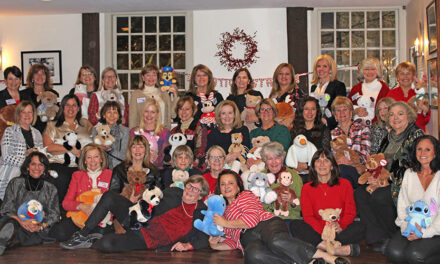Published in the January 4, 2017 edition
By MAUREEN DOHERTY
LYNNFIELD — In what could be a precedent-setting case, Lynnfield homeowner Alexander Styller has appealed to the Land Court the decision of the Lynnfield Zoning Board of Appeals (ZBA) upholding the building inspector’s cease and desist order prohibiting “rentals of 30 days or less in any single residence district.”
Styller’s five-bedroom home at 8 Needham Rd., which is located in the Single Residence RC zoning district off Chestnut Street, was the subject of a cease and desist order from violation of the town’s zoning bylaws issued by Building Inspector John Roberto III last May 31.
Roberto’s letter referenced the fact that the town had conducted a review of the Airbnb website from which it was determined that Styller was “offering to make the premises, in whole or in part, available for lodging purposes on a short-term rental basis. Under zoning law, such a use would either be a ‘hotel’ use or a ‘lodging or rooming house use.’”
Roberto stated in his letter that a hotel use was “forbidden” in Styller’s zoning district while a “lodging house” use could only be allowed by special permit, but the town’s records indicated that Styller had never sought or obtained any special permits from the ZBA.
The town first became aware that Styller was renting his personal residence for short-term rental periods of between two and 30 days in the wake of a murder that took place at the home over the Memorial Day weekend. At the time of the murder the home was occupied by a group of renters who allegedly had told Styller they planned to host a small college reunion party, according to statements Styller made in published newspaper reports, television news broadcasts and during a subsequent ZBA hearing.
The murder of Keivan Heath, 33, of Randolph, who was allegedly shot to death in the early morning hours of May 29, remains unsolved.
In a footnote included in the appeal, the issuance of the building inspector’s cease and desist letter to Styller is stated to have been prompted following “a disturbance at Styller’s residence on May 29, 2016.” Absent from this footnote is the fact that this “disturbance” resulted in an unsolved murder.
The footnote further states: “Styller’s tenant violated Styller’s lease conditions by inviting guests over and above Styller’s maximum limit of guests. The Building Inspector investigated this incident prior to the letter of May 31, 2016, but did not cite Styller relative to this incident (or the use of the residence pertaining to the incident).”
The appeal states that Roberto’s statements in his letter “constitute the sole bases (sic) for Styller’s alleged violation(s) of the bylaws for which he was provided notice.”
The ZBA voted unanimously on Nov. 1, 2016 to uphold, in part, the cease and desist order issued by Roberto prohibiting the rental of his property for 30 days or less.
During the ZBA’s third and final public hearing on Styller’s appeal on Nov. 1, Town Counsel Thomas Mullen explained to the board: “The building inspector and I take the position that the zoning bylaws, even before the recent amendment, properly construed, forbid short-term rentals in the single residence district – that is rentals of 30 days or less.”
In view of this opinion, Mullen suggested one option available to the ZBA would be to “uphold the building inspector’s cease and desist order to the extent that it sought to prohibit such short-term rentals, and also any other commercial activity in that residential property. By ‘other commercial activity’ I mean to include video shoots, parties and corporate meetings, because those three things were referenced in an advertisement for the property.”
The ZBA decision on the appeal was filed with the Town Clerk on Dec. 7, 2016, which started the 20-day statutory appeal period available to any person who felt aggrieved by the board’s decision.
Styller’s attorney, Lester E. Riordan III of Concord, filed the appeal under MGL Ch. 40A, Section 17 in the Land Court on Dec. 23, 2016. Styller was named as the sole plaintiff and named as defendants were Thomas Aylward, Patrick Rondeau, John Fallon, Brian Shaffer and Janis Markakis in their capacity as members of the Lynnfield ZBA, as well as John Roberto in his capacity as Lynnfield Inspector of Buildings.
On the same date, all of the above named defendants were issued a summons to reply to the complaint within 20 days. Aylward, Rondeau and Fallon are the three permanent members of the ZBA who voted on the appeal. Shaffer and Markakis were alternate members of the board who sat in on the hearings but did not vote. Markakis has subsequently stepped down from the board because she has moved out of town.
Request court to annul decision
Styller has requested a judicial review of the decision of the Lynnfield ZBA Case Number 16-14 and requests that the court annul the decision and grant any additional relief, “including an award of fees and/or costs” for a multitude of reasons.
The appeal alleges that “Styller’s use constitutes an existing and permissible use prior to the passage of the October 20, 2016 amendments to the Lynnfield Bylaws and therefore is permitted as a matter of right pursuant to Lynnfield Zoning Bylaws Section 11.1.”
His appeal further states that the ZBA decision “exceeds the authority of the board; is based upon legally untenable ground; (and) is unreasonable, whimsical, capricious and arbitrary.”
The appeal states that “prior to the action of the Lynnfield Building Inspector, Styller established a history of providing his property for occasional short-term residential rental use…” and makes a claim based on “information and belief” that such short-term rentals are “…very similar to occasional short-term residential rental use by other owners and residents of Lynnfield and which heretofore had not been subject to challenge and enforcement by Lynnfield’s Building Inspector.” In 2015, the appeal states that Styller rented his home for “four total stays.”
The appeal further states that at one of the three ZBA appeal hearings Chairman Aylward “acknowledged the historic leasing of residential property in Lynnfield for short-term vacation and residential rental together with recent town legislative attempts to limit or prohibit this use.”
The appeal claims that Styller “rents the residence in its entirety – as a single unit to one renter and usually in the context of one family or group.” These tenants are given “exclusive possession of the property during the length of the lease agreement” and during that period, “Styller does not remain on or in control of the premises. …Styller does not operate the residence during these rentals or provide services, including food services, directly to tenants.”
The appeal states that Styller also provides “enough on site parking consistent with the maximum occupancy of the home” but doesn’t define what that maximum occupancy would be or the number of vehicles that can be accommodated off-street at 8 Needham Rd.
Grandfathering claim
Based on the timing of the building inspector’s May 31, 2016 letter and the action taken by the town during the October Town Meeting on Oct. 20, 2016 to change the town’s zoning bylaws by prohibiting short-term rentals of 30 days or less, Styller claims to have established a pre-existing use that would be grandfathered from the changes made six months later.
The town’s zoning bylaws applicable in the Single Residence RC Zoning District when the cease and desist action was taken by Roberto “contains no express provision restricting the rental of a single-family residence as a whole – including vacation rentals,” the appeal states. Furthermore, the appeal states that Section 4.1.1(3) of the town’s bylaws did not permit either boarding or lodging houses absent a special permit or the operation of a hotel.
The appeal additionally states that since the town’s bylaws do not define the terms “hotel” or “lodging house,” the bylaw adopts the definitions of such uses as defined under the Mass. Building Code’s 2015 edition. In it, a hotel is defined as “having six or more rooms for sleeping purposes” and a boarding house “expressly excludes…any building occupied by the same group as a single unit” while a lodging house is defined as “the letting of rooms to three [independent and unrelated] occupants.”
Under the town’s bylaws, Styller maintains that the definition of a lodging house “expressly excludes …the leasing of residential real property to a single family or group.”
Based on these definitions and the fact that Styller’s appeal states that since he leases his property to “single families or groups and does not lease his property to independent and unrelated occupants and therefore such use is excluded from the meaning of ‘boarding house or lodging house’ by the Lynnfield Zoning Bylaw itself.”
Styller further argues that “(at the time of the enforcement action) Lynnfield permitted in the RC district, as an accessory use (allowed without special permit) the regular renting of rooms or the furnishing of table board in a dwelling by prearrangement to five persons” under the town’s zoning bylaws sections 4.1(10) and 5.1.5, and such “accessory use” is “excluded from the meaning of hotel, boarding house or lodging house.”
“Table board” is defined as “meals without rental of a room: distinguished from room and board.”
The appeal contends that Styller’s “established past rentals of the property to single family or group of five persons or less is permissible as a matter of right.”




